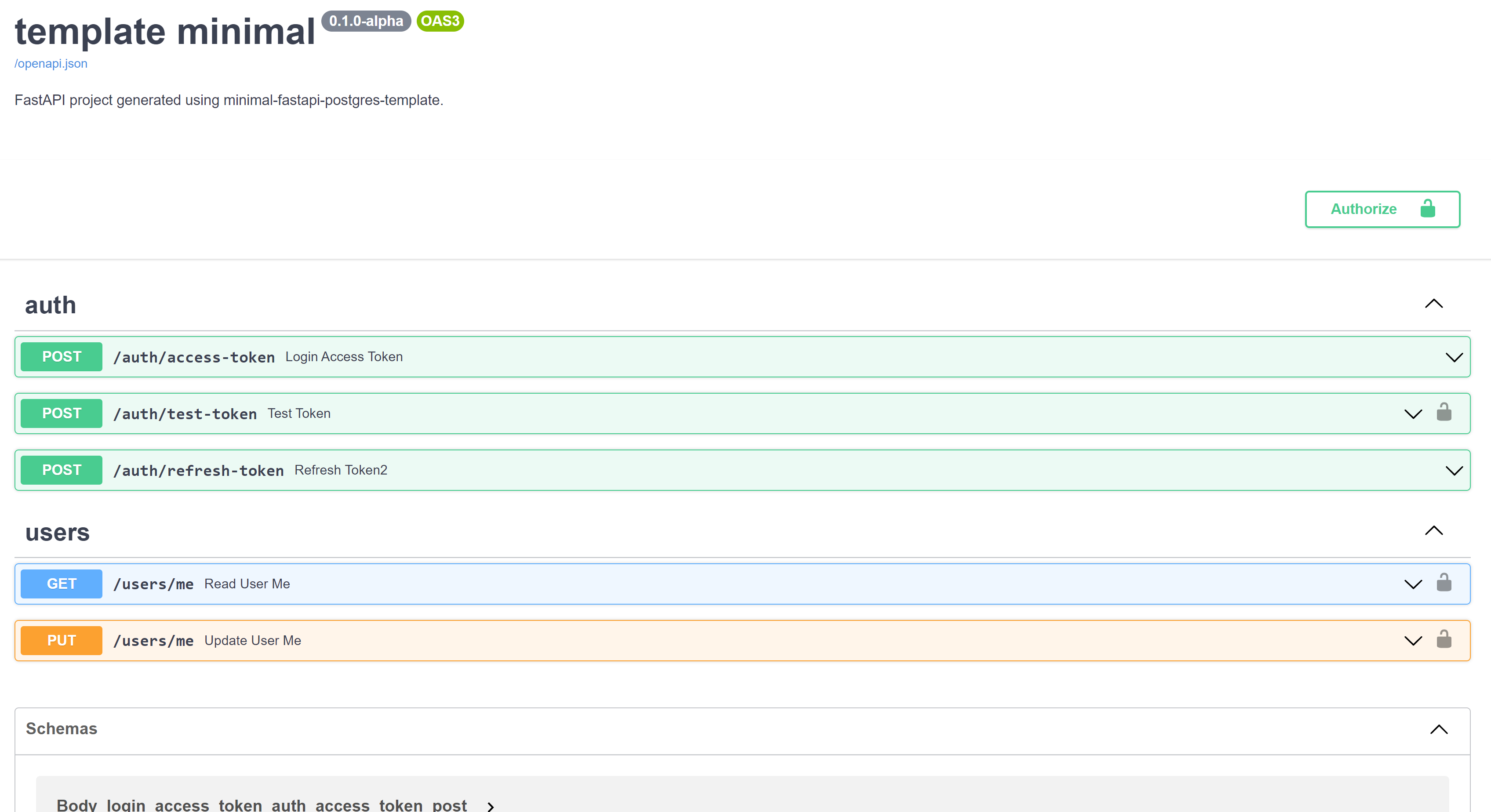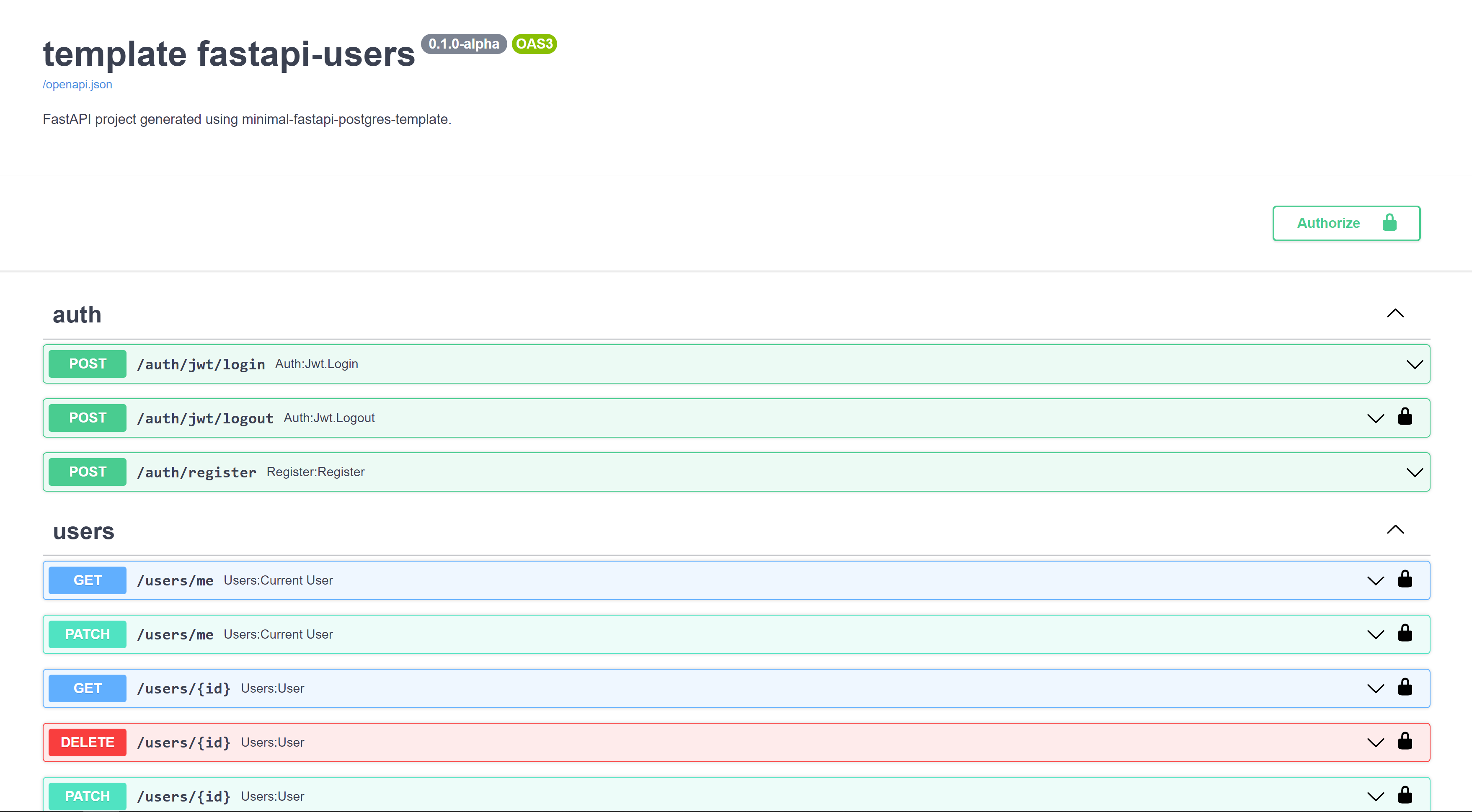
There are two templates to choose from, first minimal template is a minimal template for FastAPI backend + postgresql db as of 2021.11, async style for database sessions, endpoints and tests. It provides basic codebase that almost every application has, but nothing more.
Seconds one, fastapi-users template is similar to minimal in structure, but based on popular library FastAPI Users and very powerful (yet it require using it for user accounts management).
| This repository contains two different templates to choose from. |
|---|
- SQLAlchemy using new 2.0 API + async queries
- Postgresql database under
asyncpg - Alembic migrations
- Very minimal project structure yet ready for quick start building new api
- Refresh token endpoint (not only access like in official template)
- Two databases in docker-compose.yml (second one for tests)
- poetry
pre-push.shscript with poetry export, autoflake, black, isort and flake8- Setup for async tests, one func test for token flow and very extensible
conftest.py
Async FastAPI + postgresql template based on fastapi-users
- Extensible base user model
- Ready-to-use register, login, reset password and verify e-mail routes
- Ready-to-use social OAuth2 login flow
- SQLAlchemy using new 2.0 API + async queries
- Postgresql database under
asyncpg - Alembic migrations
- Very minimal project structure yet ready for quick start building new api
- Two databases in docker-compose.yml (second one for tests)
- poetry
pre-push.shscript with poetry export, autoflake, black, isort and flake8- Setup for async tests, one func test for token flow and very extensible
conftest.py
# Install cookiecutter globally
pip install cookiecutter
# And cookiecutter this project :)
cookiecutter https://github.com/rafsaf/minimal-fastapi-postgres-template
# decide if u want fastapi-users based template by
# changing "use_fastapi_users" in cookiecutter option to True, by default it is minimal template.
cd project_name
# Poetry install (and activate environment!)
poetry install
# Setup two databases
docker-compose up -d
# Alembic migrations upgrade and initial_data.py script
bash init.sh
# And this is it:
uvicorn app.main:app --reloadtests:
# Note, it will use second database declared in docker-compose.yml, not default one
pytest
This project is heavily base on official template https://github.com/tiangolo/full-stack-fastapi-postgresql (and on my previous work: link1, link2), but as it is now not too much up-to-date, it is much easier to create new one than change official. I didn't like some of conventions over there also (crud and db folders for example).
2.0 style SQLAlchemy API is good enough so there is no need to write everything in crud and waste our time... The core folder was also rewritten. There is great base for writting tests in tests, but I didn't want to write hundreds of them, I noticed that usually after changes in the structure of the project, auto tests are useless and you have to write them from scratch anyway (delete old ones...), hence less than more. Similarly with the User model, it is very modest, because it will be adapted to the project anyway (and there are no tests for these endpoints, you would remove them probably).
On January 30 I added another template to this repository, that is based on FastAPI Users project. The main assumptions have not changed and project structure is very similar. What it gives is not buggy, extensible, tested Users accounts managing system. This is a lot, if your project needs to manage accounts, this is definitely better than minimal template.
I always enjoy to to have some kind of example in templates (even if I don't like it much, some parts may be useful and save my time...), so let's create POST endpoint for creating dogs. For second template, there may be some differences (imports etc.)
# /app/models.py
(...)
class HappyDog(Base):
__tablename__ = "happy_dog"
id = Column(Integer, primary_key=True, index=True)
puppy_name = Column(String(500))
puppy_age = Column(Integer)# Run
alembic revision --autogenerate -m "add_happy_dog"
# Somethig like `YYYY-MM-DD-....py` will appear in `/alembic/versions` folder
alembic upgrade head
# (...)
# INFO [alembic.runtime.migration] Running upgrade cefce371682e -> 038f530b0e9b, add_happy_dogPS. Note, alembic is configured in a way that it work with async setup and also detects specific column changes.
# /app/schemas/happy_dog.py
from typing import Optional
from pydantic import BaseModel
class BaseHappyDog(BaseModel):
puppy_name: str
puppy_age: Optional[int]
class CreateHappyDog(BaseHappyDog):
pass
class HappyDog(BaseHappyDog):
id: intThen add it to schemas __init__.py
# /app/schemas/__init__.py
from .token import Token, TokenPayload, TokenRefresh
from .user import User, UserCreate, UserUpdate
from .happy_dog import HappyDog, CreateHappyDog# /app/api/endpoints/dogs.py
from typing import Any
from fastapi import APIRouter, Depends
from sqlalchemy.ext.asyncio import AsyncSession
from app import models, schemas
from app.api import deps
router = APIRouter()
@router.post("/", response_model=schemas.HappyDog, status_code=201)
async def create_happy_dog(
dog_create: schemas.CreateHappyDog,
session: AsyncSession = Depends(deps.get_session),
current_user: models.User = Depends(deps.get_current_active_user),
) -> Any:
"""
Creates new happy dog. Only for logged users.
"""
new_dog = models.HappyDog(
puppy_name=dog_create.puppy_name, puppy_age=dog_create.puppy_age
)
session.add(new_dog)
await session.commit()
await session.refresh(new_dog)
return new_dogAlso, add it to router
# /app/api/api.py
from fastapi import APIRouter
from app.api.endpoints import auth, users, dogs
api_router = APIRouter()
api_router.include_router(auth.router, prefix="/auth", tags=["auth"])
api_router.include_router(users.router, prefix="/users", tags=["users"])
# new content below
api_router.include_router(dogs.router, prefix="/dogs", tags=["dogs"])# /app/tests/test_dogs.py
import pytest
from httpx import AsyncClient
from app.models import User
pytestmark = pytest.mark.asyncio
async def test_dog_endpoint(client: AsyncClient, default_user: User):
# better to create fixture auth_client or similar than repeat code with access_token
access_token = await client.post(
"/auth/access-token",
data={
"username": "user@email.com",
"password": "password",
},
headers={"Content-Type": "application/x-www-form-urlencoded"},
)
assert access_token.status_code == 200
access_token = access_token.json()["access_token"]
puppy_name = "Sonia"
puppy_age = 6
create_dog = await client.post(
"/dogs/",
json={"puppy_name": puppy_name, "puppy_age": puppy_age},
headers={"Authorization": f"Bearer {access_token}"},
)
assert create_dog.status_code == 201
create_dog_json = create_dog.json()
assert create_dog_json["puppy_name"] == puppy_name
assert create_dog_json["puppy_age"] == puppy_age
